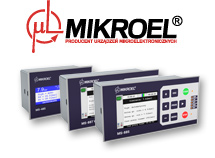Each new controller is designed from the ground up. The customer who asks us to create a control system has an impact on everything. Depending on the requirements, the designed device will have specific dimensions, a specific shape and panel colour. Electronics and electrical control are also designed to satisfy the most demanding customers. The same applies to software – the operation algorithm is developed for a specific machine, according to the customer’s guidelines. When developing software, simplicity and intuitive navigation through the menu (if the customer wishes so) is taken into account. We can also design devices containing specific telecommunication solutions – data exchange between a computer and a device, via the Internet, or between controllers.
It is this flexibility and design of the device from the ground up that allowed us to produce controllers for labelling machines, beverage dispensers, meat mixers, compressors, heating furnaces, shrink wrap furnaces, etc.
There is no limit… We are able to produce very large quantities of controllers of the same type. This is particularly important for large industrial plants where production is continuous and there is a need for continuous supply of equipment. We have a lot of experience in this area.
The complexity of our devices is very wide:
we produce from the simplest controllers, designed to turn on / off electrical circuits in specific cycles (hours), through controllers containing sensors (pressure, temperature, etc. – depending on the needs). Controllers can be controlled manually by the user – the user decides on the length of cycles, cancelling / taking various actions.
The most complex controllers – produced by us – contain telecommunication solutions. Our controllers are able to cooperate with each other and, on the basis of the information they exchange, decide on individual tasks or appropriate delegation of tasks. This is of great importance where machines cannot work all the time for production reasons (temperature, fatigue of materials, filters, etc.), or the production cycle is not constant (i.e. one time there is a need for all machines to work, the other time there is a need for only one machine to work). In addition, the devices have the ability to connect to a computer, read parameters, collect information about the consumption of individual elements of the controlled machines.
Undoubtedly, such a solution – in which the operator is informed about the need to replace filters or other elements – makes the production run smoothly, without any interruptions.
We prefer to work with medium and large mechanical machine factories, as well as with smaller plants, providing them with the required control solutions.
